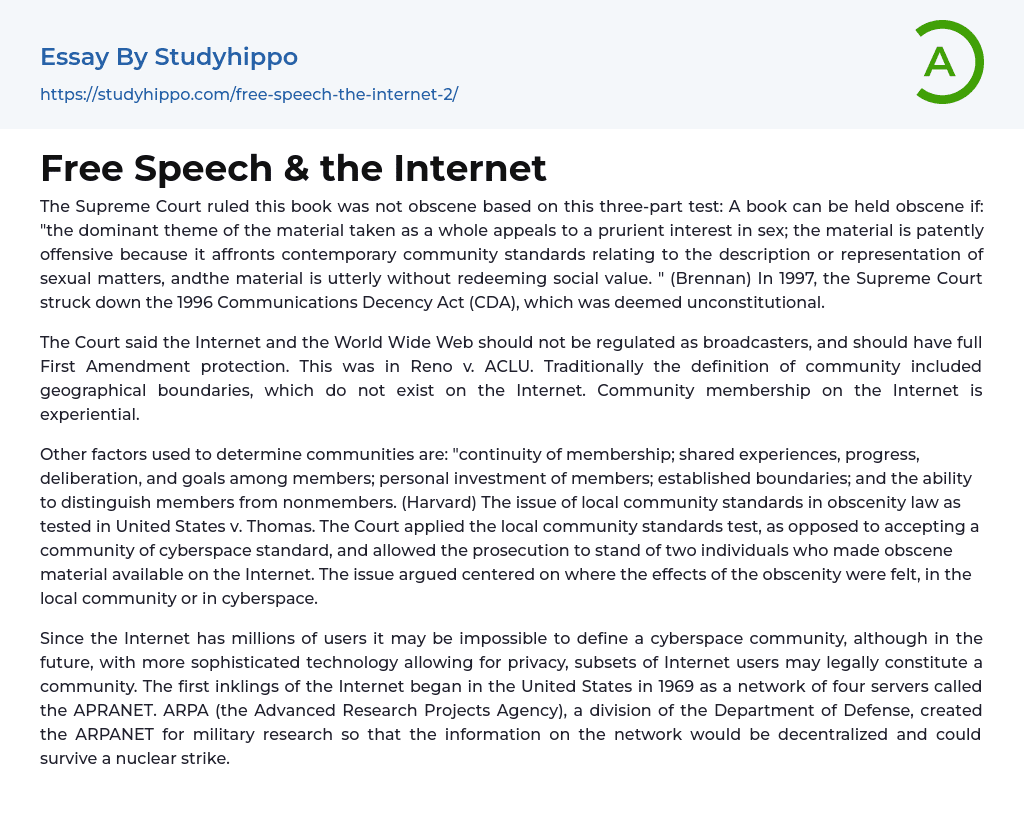The Supreme Court ruled this book was not obscene based on this three-part test: A book can be held obscene if: "the dominant theme of the material taken as a whole appeals to a prurient interest in sex; the material is patently offensive because it affronts contemporary community standards relating to the description or representation of sexual matters, andthe material is utterly without redeeming social value. " (Brennan) In 1997, the Supreme Court struck down the 1996 Communications Decency Act (CDA), which was deemed unconstitutional.
The Court said the Internet and the World Wide Web should not be regulated as broadcasters, and should have full First Amendment protection. This was in Reno v. ACLU. Traditionally the definition of community included geographical boundaries, which do not exist on the Internet. Community membership on the Internet is experiential.
Other factors us
...ed to determine communities are: "continuity of membership; shared experiences, progress, deliberation, and goals among members; personal investment of members; established boundaries; and the ability to distinguish members from nonmembers. (Harvard) The issue of local community standards in obscenity law as tested in United States v. Thomas. The Court applied the local community standards test, as opposed to accepting a community of cyberspace standard, and allowed the prosecution to stand of two individuals who made obscene material available on the Internet. The issue argued centered on where the effects of the obscenity were felt, in the local community or in cyberspace.
Since the Internet has millions of users it may be impossible to define a cyberspace community, although in the future, with more sophisticated technology allowing for privacy, subsets of Internet users may legally constitute a community.
The first inklings of the Internet began in the United States in 1969 as a network of four servers called the APRANET. ARPA (the Advanced Research Projects Agency), a division of the Department of Defense, created the ARPANET for military research so that the information on the network would be decentralized and could survive a nuclear strike.
- Federal government essays
- Armed Forces essays
- Confederate States Of America essays
- Federal Government Of The United States essays
- Fourteenth Amendment To The United States Constitution essays
- Governance essays
- Parliament essays
- Politics essays
- Jurisdiction essays
- Bureaucracy essays
- Separation Of Powers essays
- Congress essays
- President essays
- United States Congress essays
- Non-Commissioned Officer essays
- Appeal essays
- Revenge essays
- Corporate Governance essays
- Public Service essays
- Income Tax essays
- Supply essays
- Red Cross essays
- Democracy essays
- State essays
- Liberty essays
- Absolutism essays
- Reform essays
- Republic essays
- John Marshall essays
- Bourgeoisie essays
- Developed Country essays
- Elections essays
- International Relations essays
- Left-Wing Politics essays
- Monarchy essays
- Political Corruption essays
- Political Party essays
- Political Science essays
- Sovereign State essays
- United Nations essays
- World Trade Organization essays
- Contras essays
- Dictatorship essays
- Foreign policy essays
- Monarch essays
- Corruption essays
- Foreign essays
- Democratic Party essays
- European Union essays
- President Of The United States essays




